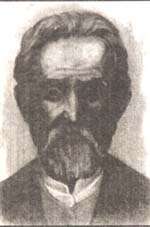Yordan Hadzhikonstantinov-Dzhinot
| Yordan Hadzhikonstantinov-Dzhinot | |
|---|---|
 | |
| Born |
c. 1818 Köprülü, Ottoman Empire |
| Died |
22 August 1882 Veles, Ottoman Empire |
Yordan Hadzhikonstantinov, called Dzhinot (the Genie) (Bulgarian: Йордан Хаджиконстантинов-Джинот, Macedonian: Jордан Хаџи Констандинов-Џинот, c. 1818 – 22 August 1882), was a Macedonian Bulgarian teacher and author, and an important figure of the Bulgarian National Revival during the 19th century.[1][2][3] Yordan Hadzhikonstantinov devoted all his life to the cause of secular public education, and he actively promoted the idea of enforcement of spoken Bulgarian language in the schools and applying of modern pedagogical practices.
He was born around 1818 in Köprülü, Ottoman empire (today in Republic of Macedonia). Yordan completed his basic education in a local church school at Veles and next he attended the high schools at Thesalonika and Samokov. In 1840 he started to teach as a private teacher, and in 1845 he was appointed a teacher in a municipal school at Veles. There Yordan involved in a conflict with the Greek clergy and he was forced to leave the town. In 1848 he settled in Üsküp (now Skopje), where he worked as a teacher in the Bulgarian school. There Yordan applied modern pedagogical methods in his practice. Meanwhile, he published some patriotic articles in the Bulgarian newspaper "Tsarigradski vestnik". In January 1857 Yordan was dismissed from the service under the pressure of the Greek metropolitan bishop of Üsküp. The same year the local Turkish authorities had Yordan exiled from Üsküp, where he would not return.
In 1861, when the Grand Vizier of the Empire visited Köprülü, Benedictus (local bishop) accused Yordan Hadzhikonstantinov of spying and conspiracy with the Serbians and the Bulgarian leader Georgi Rakovski, whose prohibited in Turkey books and newspapers Yordan had kept in his private library. The Grand Vizier believed the allegations and had Yordan exiled in Aydın, (Asia Minor). On the way to Aydin Yourdan lost one of his eyes, course he was called "The Genie" (Джинот, Dzhinot). He returned from exile in 1863 and devoted all of his time to the education.
Yordan Hadzhikonstantinov-Dzhinot died in Köprülü on 22 August 1882.
Works
Yordan Hadzhikonstantinov was in touch with The Society of the Serbian Letters (Serbian Academy of Sciences and Arts) in Belgrade and he published some of his discoveries on the pages of Glasnik magazine (an official tribune of the society). On 24 January 1854 Yordan sent from Skopie a manuscript copy of а medieval Bulgarian record, called "A narration about the restoration of the Bulgarian Patriarchate in 1235", which was discovered at first by Dzhinot and was published in Glasnik magazine in 1855. Yordan Hadzhikonstantinov-Dzhinot found a manuscript of a Bulgarian medieval story "An oration of Saint Cyryl, how he baptized the Bulgarian people", called "Solunska legenda" ("A legend from Thesalonika"). It was published in Glasnik magazine in 1856.
Yordan Hadzhikonsatntinov was author of some patriotic articles in the Bulgarian Tsarigradski Vestnik (Istanbul newspaper), as "God" (published in 1851), "Bulgarian literature" (1852), "About the Church Slavonic language" (1852), "Veles" (1857), "Prilep" (1854) etc.
They contain information about the history and geography of the Macedonian region, and also some information about the history of the Bulgarian people, Bulgarian education and the Bulgarian Church in Macedonia. Being a real Bulgarian patriot, Yordan Hadzhikonstantinov-Dzhinot thought that Bulgarians are descendants of the ancient Thracians and Illyrians. In his publications, Yordan lost no occasion to declare his Bulgarian ethnic identity: "... I am Bulgarian, and I bewail our lost Bulgarians, who are in Lower Moesia, and it is our duty to lay down our life for our brothers, the dearest Bulgarians."
Macedonian point of view
According to the Macedonian view, now prevalent and official in the books in Republic of Macedonia, Yoardan Hadzhikonstantinov-Dzhinot had Macedonian identity and "he dedicated four decades of his life to promoting education in the Macedonian language",[4] so he had an important role for Macedonian national revival and for establishment of a Macedonian literary language. The Yordan's articles, where he pointed out that he is Bulgarian, refute these Macedonian assertions.
References
Primary sources
- Iордан Хаџи Констандинов. О основанию Блъгарског Патрияршества, Гласник Друштва србске словестности, VII (Београд, 1855), с. 174-177.
- Iордан Хаџи Констандинов. Слово Кирила славенца солунскаго философа бугарскаго, Гласник Друштва србске словестности, VIII (Београд, 1856), с. 146-147.
- Йордан Хаджиконстантинов-Джинот. Българин съм. Предг., съст. и ред. И. Радев. Велико Търново: Абагар, 1993.
- Георгиев, Е. (1980). Люлка на страта и новата българска писменост (in Bulgarian). София: Държавно издателство "Народна просвета". pp. 197–211.
- Кънчов, В. (1970). Избрани произведения (in Bulgarian). T. II. София: Наука и изкуство. pp. 138–153, 230–231, 264–250.
- Тъпкова-Заимова, В.; Милтенова, А. (1996). Историко-апокалиптичната книжнина във Византия и в средновековна България (in Bulgarian). София: Университетско изсдателство "Св. Климент Охридски". pp. 311–321. ISBN 954-07-0766-8.
Secondary sources
- Modern Greek Studies Program. University of Minnesota. 1992.
- Clarke, James Franklin (1988). Dennis P. Hupchick, ed. The pen and the sword: studies in Bulgarian history. East European Monographs. ISBN 0-88033-149-6.
- Meininger, Thomas A. (1974). The formation of a nationalist Bulgarian intelligentsia, 1835-1878. Modern European history. Madison: University of Wisconsin. ISBN 0-8240-8028-9.
Notes
External lincs
- (Bulgarian)Йордан Хаджиконстантинов-Джинот. Българин съм. Предг., съст. и ред. И. Радев. Велико Търново, 1993..
- (Bulgarian) Georgiev, Emil. Люлка на старата и новата българска писменост.
- Кънчов, В. Избрани произведения. Т. II. София, 1970.
- (Bulgarian) Тъпкова-Заимова, В.; Милтенова, А. (1996). Историко-апокалиптичната книжнина във Византия и в средновековна България. София: Университетско изсдателство "Св. Климент Охридски". 311-321. ISBN 954-07-0766-8.
- (Bulgarian) Джинот - кратки биографични бележки и факсимилета от дописки